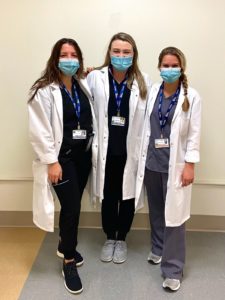Whether or not your SNF speech therapy department is staffed correctly is a great question. It is one that I am asked often by administrators, facility owners, and DORs. The short answer is always, it depends. As I am sure everyone reading this knows that their SNF is unique. The residents that you serve may not be the same as the building down the road or even across town. However, we can speak in broad brushstrokes as to what all facilities may require and depend on from their speech therapy department.
A speech department that is understaffed could be missing valuable PDPM & Part B revenue opportunities. While one that is overstaffed & underproductive is costly.
Dysphagia:
Residents are aging in place and coming to SNFs they are declining or with an exacerbation of one or more co-morbidities. In a wonderful article by Heather Morris (2006), she cites that the prevalence of dysphagia in US skilled nursing facilities is near 33%. For those of us that are mathematically challenged, that means 1 in 3 residents may have some type of dysphagia or swallowing problem. Now your speech therapy department might not carry a caseload of this size 100% of the time. However, these residents need to be assessed and their treatment plans adjusted accordingly on a regular basis.
Cognition:
Cognitive decline in the elderly and in your residents should be consistently assessed and monitored by speech therapy. Research in cognition notes a correlation between cognitive decline and depression. A decrease in a person’s ability to independently perform activities of daily living (ADLs) is typical. The nursing home speech therapy department needs to be robust enough to assess and engage residents in an appropriate cognitive plan to ensure we are addressing their specific needs.
Help your SNF Stand Out:
Besides the evaluation and treatment, the speech therapy department can be part of what makes your SNF unique. Speech-language Pathologists can be responsible for a variety of in-services that can grow and develop your entire team. They should be responsible for any low or high-tech augmentative alternative communication systems in your facility. Speech Therapy can work alone or as part of a team of respiratory, dietary, activities and nursing staff. SLPs can interact with the residents and help address specific needs through groups and activities. Groups where your SNF speech therapy department can be useful include:
- Dining groups
- Memory groups
- Reminiscing
- Medication identification
- Other ADL activities
While this is a non-exhaustive list, some things work for one facility that may not for another. As a speech-language pathologist, it is important for us to “throw our hat into the ring” and do our part to make the resident’s stay as awesome as possible.
Treating dysphagia and cognition, as well as speech program development in a team approach is how a great SNF speech department excels. If you are wondering if your speech therapy department is functioning at its highest level, consider our complimentary speech therapy department assessment.
About the Author: Michael V. Webb, CCC-SLP is the CEO of Language Fundamentals. He is a graduate from The College of Saint Rose in Albany, NY with his master’s degree in Communication Disorders and more recently earned his Master of Healthcare Administration from the University of Ohio. He has presented at the American Speech-Language and Hearing Association, on the use of assistive technology and the New York Speech-Language-Hearing Association on student and clinical fellow support and mentorship, New York State Health Facilities Association, as well as the National Convention of State Veterans Homes on Patient-Driven Payment Model implementation and the new role of Speech-language pathology.



